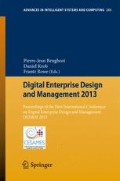Abstract
The reduction of greenhouse gases (GHGs), including carbon dioxide (CO2 ), has become one of the most serious issues in the world today to build a sustainable world. Digital economy have several contributions to the reduction of GHG emissions. Among them, Carbon credits is one of themost important and effect approach to reducing the amount of GHG emissions, where carbon credits are generated by the reduction of CO2 emissions in sponsoring projects, which increase CO2 absorption, such as renewable-energy, energy-efficiency, and reforestation projects. Although carbon credits themselves do not reduce the amount of CO2 emissions around the world, they are important incentives for GHG reduction projects.
Access this chapter
Tax calculation will be finalised at checkout
Purchases are for personal use only
Preview
Unable to display preview. Download preview PDF.
References
Bang, M., Gustafsson, A., Katzeff, C.: Promoting new patterns in household energy consumption with pervasive learning games. In: de Kort, Y.A.W., IJsselsteijn, W.A., Midden, C., Eggen, B., Fogg, B.J. (eds.) PERSUASIVE 2007. LNCS, vol. 4744, pp. 55–63. Springer, Heidelberg (2007)
Dada, A., Staake, T., Fleisch, E.: The Potential of UbiComp Technologies to Determine the Carbon Footprints of Products. In: Proceedings of Pervasive Computing 2008 Workshop on Pervasive Persuasive Technology and Environmental Sustainability, pp. 50–53 (2008)
Froehlich, J., Dillahunt, T., Klasnja, P., Mankoff, J., Consolvo, S., Harrison, B., Landay, J.A.: UbiGreen: investigating a mobile tool for tracking and supporting green transportation habits. In: Proceedings of the 27th International Conference on Human Factors in Computing Systems (CHI 2009), pp. 1043–1052. ACM (2009)
Ilic, A., Staake, T., Fleisch, E.: Using Sensor Information to Reduce the Carbon Footprint of Perishable Goods. IEEE Pervasive Computing 8(1), 22–29 (2009)
IPCC fourth assessment report: Climate change. Technical report, IPCC (2007), http://www.ipcc.ch/
McCalley, T., Kaiser, F., Midden, C., Keser, M., Teunissen, M.: Persuasive Appliances: Goal Priming and Behavioral Response to Product-Integrated Energy Feedback. In: IJsselsteijn, W.A., de Kort, Y.A.W., Midden, C., Eggen, B., van den Hoven, E. (eds.) PERSUASIVE 2006. LNCS, vol. 3962, pp. 45–49. Springer, Heidelberg (2006)
Stern, N.: The Economics of Climate Change: The Stern Review. Cambridge University Press (2007)
Author information
Authors and Affiliations
Corresponding author
Editor information
Editors and Affiliations
Rights and permissions
Copyright information
© 2013 Springer-Verlag Berlin Heidelberg
About this paper
Cite this paper
Satoh, I. (2013). Digital Value Chains for Carbon Emission Credits. In: Benghozi, PJ., Krob, D., Rowe, F. (eds) Digital Enterprise Design and Management 2013. Advances in Intelligent Systems and Computing, vol 205. Springer, Berlin, Heidelberg. https://doi.org/10.1007/978-3-642-37317-6_9
Download citation
DOI: https://doi.org/10.1007/978-3-642-37317-6_9
Publisher Name: Springer, Berlin, Heidelberg
Print ISBN: 978-3-642-37316-9
Online ISBN: 978-3-642-37317-6
eBook Packages: EngineeringEngineering (R0)

